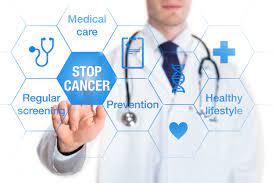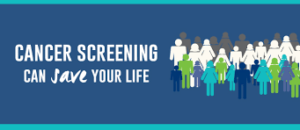
According to the American Cancer Society, elective procedures including cancer screenings were often placed on-hold during the pandemic to help prevent the spread of infection. Regular cancer screenings, however, remain very important for both disease prevention and early detection and treatment. Many healthcare providers have re-initiated cancer screenings now that the incidence of COVID-19 is decreasing in many areas.
The National Center for Chronic Disease Prevention and Health Promotion identifies cancer as the second leading cause of death in the United States. Annually, over 1.6 million people are diagnosed with cancer and about 600,000 deaths occur. There are more than 100 types of cancer with a number of them more prevalent, such as, lung, skin, colorectal, breast, cervical, ovarian, and prostate cancers. An essential role of primary care practitioners is to educate patients about cancer screenings and healthy, personal choices to help minimize the risk for cancer. March is designated as National Colorectal Cancer Awareness Month to promote public knowledge about this disease including screenings, such as colonoscopy and stool tests, that can uncover any issues before they progress. In general, screenings look for cancer and potentially precancerous conditions in those who do not have symptoms. The good news is that through periodic screenings many cancers can be prevented or caught early when treatment is likely to work best.
Check with your physician about arranging cancer screenings that you may have missed during the COVID-19 pandemic. A review should be done to prioritize screenings you may need based on your risks and the timing of your last screenings.

Some common risk factors for cancer include smoking, second-hand smoke, sun and other ultra-violet light exposures, obesity and being overweight, excessive alcohol consumption, and certain infectious diseases, such as, Human Papillomavirus (HPV) and Hepatitis B and C. Since there are a number of other risks as well as various cancer screenings, it’s best to talk with your physician about an overall plan. For more information about cancer and recommended screenings refer to the American Cancer Society Guidelines for the Early Detection ofC
ancer at https://www.cancer.org/healthy/find-cancer-early/cancer-screening-guidelines.html and the CDC’s Cancer Screenings site, https://www.cdc.gov/cancer/dcpc/prevention/screening.htm. Through regular screenings and healthy lifestyle choices you can help reduce the risk for cancer.
If you develop symptoms that may indicate cancer, for example, blood in your stool, a lump in your breast, and, or unexplained weight loss you should immediately contact your physician to receive a more extensive evaluation.
As COVID-19 continues to be a public health emergency, healthcare providers who offer screenings should still practice infection control precautions to protect their patients.

This includes pre-screening patients for COVID-19 symptoms and exposure, scheduling appointments to ensure proper physical distancing, limiting other visitors, hand hygiene protocol for patients and staff, cleaning and disinfecting equipment and surfaces in between use, and wearing a face mask at all times. Ask your health care provider about these precautions when scheduling your appointment. Your physician should also offer secure, telehealth visits to discuss screening needs if that is your preference during the pandemic.




